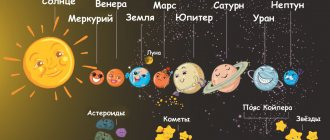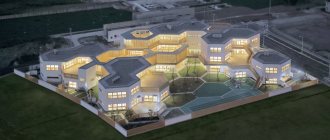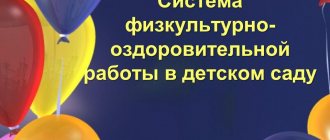Health education - valeological education
Health education is one of the objectives of the Research Priorities for Health for All (WHO, 1989). Pedagogical valeology is a new area of scientific knowledge, emerging at the intersection of general pedagogy and valeology, bringing health, predetermining the principles and ways to achieve physical, mental and social well-being, increasing reserve capabilities. Educational institutions at all levels are called upon to implement the pedagogical direction of valeology, forming a culture of health among subjects of the educational process, which will ensure positive changes in the health of the population in the future.
Relevant are the development and implementation of a comprehensive program for valeological support of preschool education, including both tasks for the prevention of children’s diseases, the development of their physical and mental reserves, and tasks for the formation of stereotypes of a healthy lifestyle, as well as training parents in valeological methods of analysis and correction of children’s health.
According to many Russian scientists, the modern educational system is not aimed at preserving and improving the health of students and teachers, but at deteriorating it. According to statistics, 80-85% of school-age children are in poor health, more than half of university students need treatment, and more than 85% of teachers have chronic diseases. The professional activity of a teacher does not contribute to the preservation of his health - among teachers with experience there are practically no healthy ones. During the training period, the number of healthy children decreases. The reasons for this situation, according to official data, are factors of the intra-school environment: overcrowding of classes, non-compliance of furniture with hygienic standards, air pollution in school premises, joint education of children with different levels of training, authoritarian style of work of the teacher, overloaded curriculum, unfavorable psychological climate of school groups. The low level of health of school graduates negatively affects the production potential and defense capability of the country.
According to domestic valeologists, pedagogical valeology should ensure the formation of valeological literacy, a valeological approach to the educational process, and health-improving work during school and extracurricular hours.
The introduction of pedagogical valeology involves two directions: conducting health lessons, starting from the first grade, and valeologization of the entire education system. The latter assumes that every lesson and any school event should contain a health-improving effect, prevent the development of overwork, and not worsen health, but promote its development. This can be achieved by solving the problem of school nutrition, optimizing the motor regime, hardening, conducting full-fledged physical education lessons, and observing hygiene requirements. The effectiveness of the educational process largely depends on the implementation of the listed components of the school regime (Kazin, 1999).
The formation of children's health by pedagogical means should depend not only on the efforts of the valeologist teacher, but also on the participation of educators, teachers of all specialties, the entire teaching staff of not only schools, preschool institutions, but also institutions of additional education. Improving educational regimes and pedagogical technologies by valeologists alone is impossible if the valeology culture of the entire teaching staff is insufficient. By valeological culture of a person, V.V. Kolbanov understands not only valeological awareness, but also a dynamic stereotype of behavior developed on the basis of true needs that contribute to a healthy lifestyle and determines a careful attitude towards the health of others. One of the difficulties in introducing the valeological paradigm is the requirement for valeological training of teachers of all specialties.
At the end of the 90s, a new scientific direction and specialty “Valeology” was opened in Russia, and an educational standard was developed for the training of specialists-valeologists. The state education system in this specialty should be aimed at training specialists who know the functional capabilities of a healthy person’s body at all age stages, who are able to promptly and effectively identify deviations from age standards and actually provide individual correction of a person’s condition and its development. The professional activity of such a specialist should be ensured by interdisciplinary fundamental knowledge of human biology and practical training that ensures the determination of the level of health and the implementation of correction in case of functional disorders. The issue of opening the specialty “Valeology” for awarding candidate and doctoral academic degrees was discussed. Unfortunately, not only was the new specialty of the Higher Attestation Commission not introduced, but also the training of specialists with higher valeological education was stopped. Despite the fact that valeology currently in the Russian Federation does not have these official forms of recognition, many well-known scientists in leading Russian scientific centers are actively working on the problems of the formation, development, preservation and strengthening of human health at all age stages.
Significant successes in solving issues of valeology education have been achieved in a number of regions of the Russian Federation: St. Petersburg, Kemerovo region, Rostov region, Novosibirsk region, Tula, Lipetsk, Krasnoyarsk, etc. There is an urgent need to form a valeology service not only in every educational institution, but also in general in municipal, regional and federal education systems. The need to create such a service is confirmed by the fact that despite numerous methodological, organizational, and financial difficulties, it is being introduced in educational institutions of all types and levels in various regions.
The active work of scientists of various specialties to introduce health-saving forms of education and health teaching methods was demonstrated at the I All-Russian Scientific and Practical Conference “Functional State and Human Health”, which took place at Rostov State University in September 2006.
The practice of introducing health-saving technologies into the education system of the Kemerovo region convincingly demonstrates the need to create in each municipality an integral territorial program that would orient each district, city and each educational institution towards the solution (implementation) of the formation of an integral health-preserving environment and socio-pedagogical space within the framework of three main problems: creating conditions conducive to maintaining and promoting health in educational institutions; organizing and conducting interdepartmental activities to protect and promote the health of subjects of the educational process; ensuring continuous education of teachers and students on the issues of formation, preservation, strengthening and development of physical, mental and social health.
The strategic goal of the proposed programs is to improve the quality of education while maintaining and developing the physical, mental and social health of children and adolescents of educational institutions through the implementation of individually oriented psychological, pedagogical, social and medical assistance to students, pupils, psychological and physiological support of the educational process in order to solving problems of school and social adaptation and maladjustment, scientific justification for the choice of individual pedagogical programs and training profile.
A valeology center has been created at the Krasnoyarsk State Technical University, the director of which is Professor O. N. Mos-Kovchenko, programs have been developed that include a set of diagnostic and preventive measures that increase the intensity of the implementation of valeology in improving human life. The experience of the successful operation of the valeocenter has already been extended to other universities in the city. It has been shown that the introduction of health-saving technologies into educational activities can increase students' interest and develop the need for self-education. The exchange of original educational programs by specialists from different universities in related fields of knowledge significantly expands the range of valeological education and contributes to the faster implementation of new educational technologies aimed at the effectiveness of the educational process in solving problems of a theoretical and practical nature. The goal of health-saving technologies is to develop sustainable motivation for self-development, self-realization, and self-improvement. The formulated goal defines the basis of a culture of health as a multifaceted concept of an integral system, the components of which are not only the physical potential of a person, but also his spiritual and moral health - as socially significant qualities of an individual. (Moskovchenko, Furyaeva. Krasnoyarsk).
The Health Center of Tula State University was created. Original equipment has been developed for monitoring the health of students. Based on the results of the examination, a conclusion is formed in real time, which indicates the group of functional state, according to R. M. Baevsky, the results and assessment of the tests performed (including dynamics), the risks of deviation of functional systems and a detailed individual rehabilitation program. The rehabilitation program can also be completed at the Health Center.
At the Center for Medical Prevention "Origins of Health" in Ryazan, the hardware and software complex "Origins of Health" has been developed and successfully used to assess, predict and correct the functional health reserves (adaptation reserves) of participants in educational and labor activities, to create and use a person's "Health Passport" .
Tomsk State University has created an Automated Complex for assessing human functional reserves and maintaining a “health passport”. The complex is registered with Rospatent, tested and implemented in a number of educational institutions in Siberia, and has been awarded awards at regional exhibitions.
For the purpose of early pre-nosological diagnosis of a decrease in the body’s ability to prevent the occurrence of diseases, the Pulsar-A complex was developed at the Modern Humanitarian Academy (Moscow). The development was carried out on the basis of the classical concepts of variation pulsometry. The Pulsar-A software and hardware complex has shown high sensitivity and reproducibility of results during mass examinations and can be used for ongoing examination of the health status of students, as an element of a health-saving education system in higher educational institutions that use distance technologies as a primary screening method (Kachalova, Kish , Loginov, 2006)
At the St. Petersburg State University of Aerospace Instrumentation, as part of the work on the topic “Methodology for screening assessment of the health of children and adolescents using multifunctional diagnostic complexes,” prototypes of the multifunctional hardware-software complex “Cyrillic-Az” were developed and manufactured based on original proprietary devices for non-invasive information acquisition. This complex is designed for simultaneous ECG recording via 12 channels and subsequent automatic contour analysis of data and implementation of variational pulsometry techniques approved by the Ministry of Health of the Russian Federation. The use of the Cyrillic-Az complex in the framework of city clinical diagnostic (St. Petersburg) screening examinations of more than two thousand adolescents aged 10-15 years showed that such characteristics of the complex as a stable software environment, the ability to work in monitor mode, autonomy, as well as its extreme simplicity and convenience for nursing staff, allow us to come close to the organizational and methodological optimization of clinical examination of the young population of St. Petersburg (Kilimnik et al., 2006).
Scientists from the Orenburg State Pedagogical University argue that health pedagogy, based on health-saving educational technologies, is a new priority direction in education. Its main subject is valeologization of education, which involves:
1. Learning to manage one’s own health, developing an individual lifestyle and the ability to make the necessary adjustments to it in the process of current life activities.
2. Mastery of the theory and methodology of developing motivation for a healthy lifestyle in children, adolescents and young people and developing a “health-giving” way of life.
3. Formation of skills to create in the process of raising and educating children, adolescents and young people (both in educational institutions and in the family) such a pedagogical information environment that would correspond to the true needs of students and would ensure the involuntary formation of the main components of health in them - somatic, mental , social (Meerson, Ermakova, 2006).
The “ESKIZ” program (Expert System for Correcting Individual Health), developed at the State Research Center for Preventive Medicine in Orenburg under the leadership of Academician of the Russian Academy of Natural Sciences I. A. Gundarov, is a modern certified product focused on analyzing health reserves and identifying factors for its possible loss. For a relatively short period of its use, the SKIZ program made it possible to demonstrate its capabilities in organizing a service for mass individual prevention of major non-communicable diseases in outpatient settings (Deryabin, Komarov, 2006).
In the city of Kirov, scientists from the Vyatka State Humanitarian University have developed and are implementing in schools in the city and region a comprehensive target program “School of Health” for class teachers, teachers, parents, and students. In educational work, preference is given to the synthesis of the “Health” program with the basic component of the curriculum, i.e., the health-creative potential of academic disciplines and elective courses is used. A number of schools offer health lessons in grades 1-5. An example is the program of the elective course “Culture of Health”, which is one of the sections of the regional ecology course and reflects modern ideas about the formation of a healthy lifestyle and the creation of a health-saving educational environment. The programs being implemented are aimed at solving the main tasks of creating the need for a healthy lifestyle and a responsible attitude towards one’s health based on creating positive motivation through self-knowledge, self-development, and self-improvement (Voronina, 2006).
Thus, there is a real opportunity to improve the health of the population in modern socio-economic and environmental conditions through the introduction of a system for developing a healthy lifestyle for people from childhood through the valeologization of the educational environment.
Prev. article
- Compliance with life safety rules, including adherence to the principles of safe sex as AIDS prevention
Book's contents
Track. article
- The concept of valeological centers. Methodology and concept of maintaining a health passport
Comments on the article “Health education - valeology education”
Valeological education of children in a preschool educational institution
This article discusses the main tasks of valeology, its direction and purpose, as well as methods and techniques in valeology classes. This article will help preschool teachers see the need to introduce preschoolers to a healthy lifestyle.
Key words: valeology, health, healthy lifestyle, health culture, teaching, personal hygiene, healthy lifestyle, Federal State Educational Standard.
In order to understand whether it is necessary to use valeology in a preschool institution, it is necessary to understand what “valueology” is and where did this concept come from?
Valueology is the science of the art of being healthy, maintaining health, leading an active and healthy lifestyle, which must be learned from an early age.
The word “valeology” comes from the Latin word: “valeo” - to be healthy.” This term was introduced into scientific circulation by the Russian pharmacologist, Doctor of Medical Sciences, Professor Brekhman, Israel Itskovich, he became the creator of a new branch of medicine - valeology, and Brekhman is also the inventor of many medications.
Valeology includes several components: medicine, pedagogy, psychology, hygiene, physical education, social studies, ecology, biology, life safety.
In preschool institutions, this science has become one of the priority areas of the educational process for preschoolers.
Health has always been and will be in first place, therefore the central problem of valeology is the attitude towards individual health and the cultivation of a culture of health in the process of individual development of the child’s personality.
“Valeology is an interscientific direction of knowledge about human health, about ways to ensure it, form and preserve it in specific conditions of life. As an academic discipline, it represents a body of knowledge about health and a healthy lifestyle. E. N. Weiner" [4]
The goal of valeology in preschool educational institutions is to develop health and expand the reserve capabilities of the body of children from an early age, increasing the quantity and quality of health.
Weiner Eduard Naumovich identified the main tasks of valeology :
- Research and quantitative assessment of human health and health reserves.
- Formation of an attitude towards a healthy lifestyle.
- Preservation and strengthening of human health and health reserves through introducing him to a healthy lifestyle [1].
The subject of valeology is individual health and human health reserves, as well as a healthy lifestyle. This is one of the most important differences between valeology and preventive medical disciplines, the recommendations of which are aimed at preventing diseases.
From the outside it may seem that this science does not contain anything complicated. However, it is not. After all, valeology considers health comprehensively, holistically, including all its sides and aspects and studying it from all sides and options. Due to the global nature of the concept, valueology is associated with a whole complex of other sciences.
According to the Federal State Educational Standard, the educational field is aimed at achieving the goals of protecting children's health and forming the basis of a culture of health by solving the following tasks:
- Preservation and strengthening of children’s physical and mental health
- Education of cultural and hygienic skills
- Formation of initial ideas about a healthy lifestyle [2].
Raising a valeological culture in children means creating motivation for the formation, preservation and strengthening of health.
The valueological culture of a preschooler implies:
– knowledge about your health;
– conscious attitude towards human health and life;
– the ability to protect, maintain and maintain health;
– valeological competence.
The Federal State Educational Standard (FSES) identifies the main areas of valnology:
– Human structure.
– The importance of healthy food.
– How to maintain your health. [2]
The direction of work of valeological education of preschool children should be implemented not only within the framework of direct educational activities (DEA) (in the classroom), but also during the organization of: leisure activities, entertainment, matinees, walks, and routine moments.
The main allies of the teacher in maintaining the health of the preschooler are the parents. Interaction with parents is necessary, as they are the standard for the child. The teacher needs to convey to them the importance and need to participate in raising the health of their children. To do this, it is necessary to conduct consultations on the topic of “health”; events together with parents “mom, dad, me - a sports family”, etc.
Methods and techniques in valeology classes:
Regardless of the nature of the educational activity, the teacher uses a combination of techniques from four groups of methods (verbal, visual, practical, game).
Verbal method - in a preschool institution, speech is important not only as a means of learning, but also as a way of communication. For younger groups, this means faster speech development, and for older groups, an expansion of vocabulary.
- dialogue
– conversation (reasoning)
– explanations
– reading literature
Visual method - the use of visualization is necessary for the successful implementation of the objectives of the educational process. Since preschool children perceive information only when accompanied by illustrations.
– observation
– display (examination of paintings, illustrations)
– demonstration (slides, filmstrips, films)
Practical method - The techniques of this method involve the child’s practical mastery of reality.
– drawings
– applications
– crafts
– experiments
The game method allows preschoolers to master entire blocks of new valeological knowledge, skills and abilities.
– didactic
– movable
– theatrical
Innovative method - allows the child to move with the times, master new games, developing logic, thinking, fine motor skills, etc.
– Montessori
– fairytale therapy
– sand therapy
– TRIZ, etc.
Valueology in kindergarten is very important in the education of the future schoolchild. This science teaches preschoolers to take care of their health and strengthen their body, preventing possible diseases. Since valeology includes a whole complex of sciences, children, in addition to taking care of their bodies, learn to correctly express their emotions and feelings, taking care of their psycho-emotional state. They learn not to be afraid of the dangers around them, but to beware of them and look for ways to eliminate them, and also develop the need to take care not only of themselves, but also of the people around them.
Literature:
- Weiner E. N. Valeology: Textbook for universities. 2001. - M.: Flinta: Nauka, 2001. - 416 p.
- Federal State Educational Standard for Preschool Education (approved by order of the Ministry of Education and Science of the Russian Federation dated October 17, 2013 No. 1155, registered with the Ministry of Justice of Russia on November 14, 2013 No. 30384) access mode: //www/firo.ru/? page_id=11678
- From birth to school. Approximate general educational program for preschool education / Ed. N. E. Veraksy, T. S. Komarova, M. A. Vasilyeva. — M.: MOSAIKA$SYNTHESIS, 2014. — 334 p.
- “Valeology: a textbook for universities,” 2021 (quote from the Google Books library).




